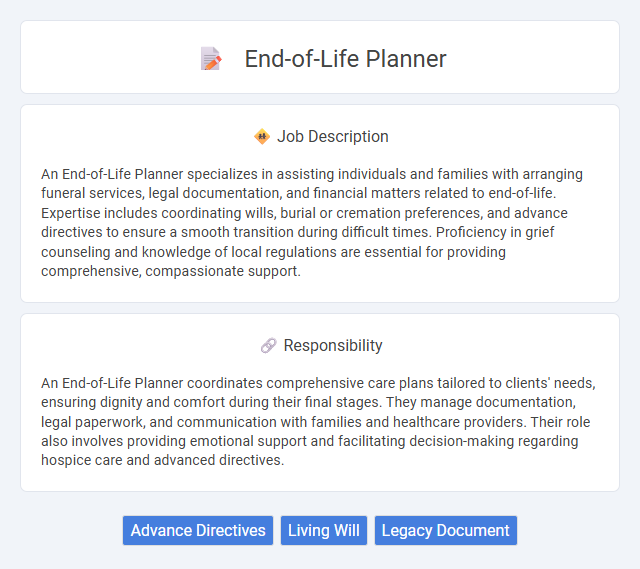
An End-of-Life Planner specializes in assisting individuals and families with arranging funeral services, legal documentation, and financial matters related to end-of-life. Expertise includes coordinating wills, burial or cremation preferences, and advance directives to ensure a smooth transition during difficult times. Proficiency in grief counseling and knowledge of local regulations are essential for providing comprehensive, compassionate support.
Individuals with strong emotional resilience and compassionate communication skills are likely to be suitable for an End-of-Life Planner job, as the role involves supporting clients through sensitive and challenging decisions. People who can maintain professionalism while navigating grief and uncertainty may find this position aligns well with their abilities. Those who struggle with emotional stress or prefer less emotionally charged environments might not be the best fit for this career.
Qualification
An End-of-Life Planner must possess strong communication and organizational skills, coupled with a thorough understanding of legal and ethical standards related to end-of-life care. Qualifications often include certification in palliative care, counseling, or social work, alongside experience in healthcare or hospice environments. Expertise in grief counseling and advanced knowledge of patient rights and healthcare directives further enhance the planner's ability to support clients effectively.
Responsibility
An End-of-Life Planner coordinates comprehensive care plans tailored to clients' needs, ensuring dignity and comfort during their final stages. They manage documentation, legal paperwork, and communication with families and healthcare providers. Their role also involves providing emotional support and facilitating decision-making regarding hospice care and advanced directives.
Benefit
End-of-Life Planners likely help individuals organize their final affairs, reducing stress for both clients and their families. Their guidance may improve the probability of seamless estate transitions and minimize legal complications. Working in this role, one might experience fulfillment from providing peace of mind during challenging times while also benefiting from a growing demand for these specialized services.
Challenge
End-of-Life Planners likely face the challenging task of navigating sensitive conversations while managing complex legal and emotional factors simultaneously. The role probably demands high emotional intelligence to support clients through difficult decisions with compassion and clarity. Balancing logistical arrangements and personalized care plans could be a consistent source of professional stress and fulfillment.
Career Advancement
End-of-Life Planners provide essential support by organizing and managing final arrangements, ensuring clients' wishes are honored with compassion and precision. Career advancement in this field often leads to senior roles such as Director of Client Services or Certified Funeral Service Practitioner, expanding responsibilities to strategic planning and team leadership. Professionals who earn certifications like the Certified End-of-Life Consultant (CELC) increase their marketability and open pathways to counseling, coaching, or entrepreneurial opportunities within the deathcare industry.
Key Terms
Advance Directives
End-of-Life Planners specialize in assisting individuals with the creation and execution of Advance Directives, ensuring that healthcare preferences are clearly documented and legally binding. These professionals provide guidance on living wills, durable power of attorney for healthcare, and other critical documents that outline medical treatment choices during incapacitation. Expertise in state-specific regulations and compassionate communication skills are essential for navigating sensitive conversations and aligning plans with personal values and legal standards.
Living Will
An End-of-Life Planner specializes in creating comprehensive Living Wills that outline medical treatment preferences when individuals cannot communicate their decisions. They ensure legal compliance and clarity for healthcare providers and family members, reducing stress during critical moments. Expertise in advance directives and state-specific regulations is essential for effective planning and execution.
Legacy Document
An End-of-Life Planner specializes in creating and organizing Legacy Documents that capture personal stories, values, and important family information to ensure meaningful memories are preserved for future generations. This role involves detailed consultation with clients to compile wills, advanced directives, and ethical wills, prioritizing clarity and accessibility. Effective Legacy Documents crafted by End-of-Life Planners provide emotional comfort and practical guidance during estate settlement and inheritance processes.
 kuljobs.com
kuljobs.com